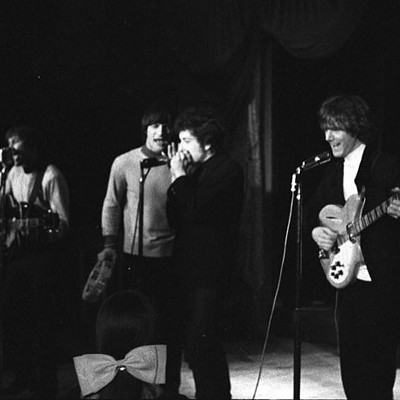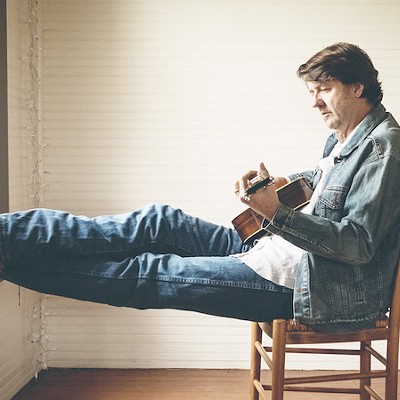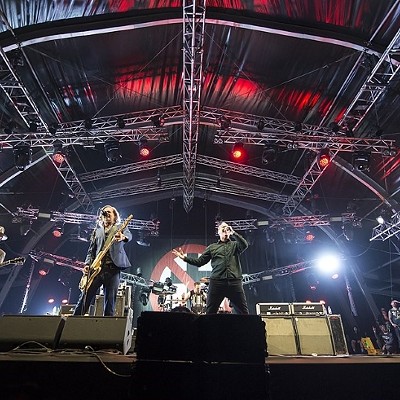What was the last great U2 album?
Now, before you go and get your snotty Henry Rollins quotes lined up, recall that there was a period in the mid- to late 1980s when the Dublin foursome were both the biggest and most critically acclaimed band on the planet before veering off into sonic experimentation and retreating somewhat from the public eye.
In my opinion, one can make valid "greatness" arguments for four of their albums. Some prefer the anthemic, clarion calling of War, others the muted melancholy of The Unforgettable Fire, while many would argue that 1987's The Johsua Tree was the band's perfect fusion of the earnest and the cynical.
But for some, myself included, U2's high point was achieved by the album that was both a response to post-Joshua Tree backlash and precursor to their millennial experimental forays into pop and house music: Achtung Baby.
When U2 played Glastonbury last year, their set largely consisted of cuts from Achtung Baby, which makes a certain amount of sense, considering the album was celebrating its 20th anniversary. To prepare, U2 began rehearsals in Winnipeg. At the same time, filmmaker Davis Guggenheim (Waiting for Superman, An Inconvenient Truth) was commissioned to make a movie commemorating the album.
Guggenheim was given wide access to U2's archives, including previously unreleased footage from Rattle and Hum, Phil Joanou's ill-received 1988 documentary film of the Joshua Tree tour. Meanwhile the band returned to Hansa Studios in Berlin to "revive and rethink" the album.
From the Sky Down spends a lot of time on the band's early (like, pre-Boy) years, which is nice and all (did you know Bono gave future wife Ali Kraftwerk's Man-Machine for her 15th birthday?). But for a movie billed as "the story of the making of U2's Achtung Baby," it takes them quite a while to get to the album itself.
More interesting, to me, was how the band addressed their public perception in the wake of the Joshua Tree's success. To hear them tell it, Rattle and Hum did a poor job at capturing the band's insecurity and self-deprecation, and Joanou's exclusion of anything humorous led to critics and audiences viewing them as pretentious. This was especially true of their love of blues music, where people took guest appearances by B.B. King as Bono having the audacity to act like he'd discovered him.
After seeing the footage Guggenheim includes, I'm inclined to give the boys the benefit of the doubt. And I say this as one who spent half of R&H's running time cringing in the theater. That said, you might come across as less of an asshole if you took your mirror shades off during indoor interviews, Adam Clayton.
[Side note: Some of the unearthed footage included a surprise gig the band played with SRV and T-Bone Burnett at Antone's the Monday night after their 1987 show at the Frank Erwin Center. I was supposed to go to Antone's that night with my friend Sarah and ended up wimping out. She's never forgiven me.]
Some of this extended background is revealing, however. For instance, there's an interview in which Brian Eno and Daniel Lanois (who'd produced Unforgettable Fire and The Joshua Tree as well as Achtung) divulge that Bono's vocals come in at the end of their songwriting process. He mostly just syllabizes while they're working on melody, then writes the lyrics. Hence, building the house "from the sky down."
So anyway, the band — weary of criticism and burned out from their extended "Americanization" — took a break from 1989 to 1991. With Bono and the Edge listening to bands like Einstürzende Neubauten and the burgeoining Manchester house scene. The two started laying down dance-oriented tracks in Dublin, then were drawn to Berlin by the fall of the Berlin Wall and ensuing cultural conflict, which they felt was a perfect metaphor for their own situation.
Things didn't start out smoothly (Bono acknowledges his dictatorial ways from the band's early days, and he does seem to have gone from shouting over/at people to a more relaxed, sardonic role), and there was much arguing and gnashing of teeth over the band's direction (I'm surprised they allowed cameras during the Achtung Baby sessions at all, considering...well, you know). But listening to the initial DATs from those early sessions, where the original bridge from "Mysterious Ways" turns into "One" ("a bittersweet song about disunity"), is when you really see how the mood shifted.
Although apprently Brian Eno hated the song.
From there, they moved on to "The Fly" and planted the seeds of what was to become the Zoo TV tour. Most of what follows is well-documented: the band threw off their earnest and often preachy image for a more ironic one. The 1990s were a decade of experimentation with looping and dance pop, and it's kind of interesting that a number of fans who jumped on the band's case for their supposed "pretentiousness" more or less abandoned them when they tried changing things up.
But my primary takeaway from the film was frustration. I felt Guggenheim barely scratched the surface of what is, in my opinion, one of the best albums of the last 30 years. Songs other than "One" and "Mysterious Ways" are barely touched upon, with more time given to letting the band air their late 80s grievances than talking about the film's alleged subject matter.
From the Sky Down does include some interesting bits, and the archival footage is lots of fun, but in the end it feels like Guggenheim blew an opportunity to give U2 fans a more insightful look at a classic piece of music.
From the Sky Down is available on DVD and Blu-ray.






